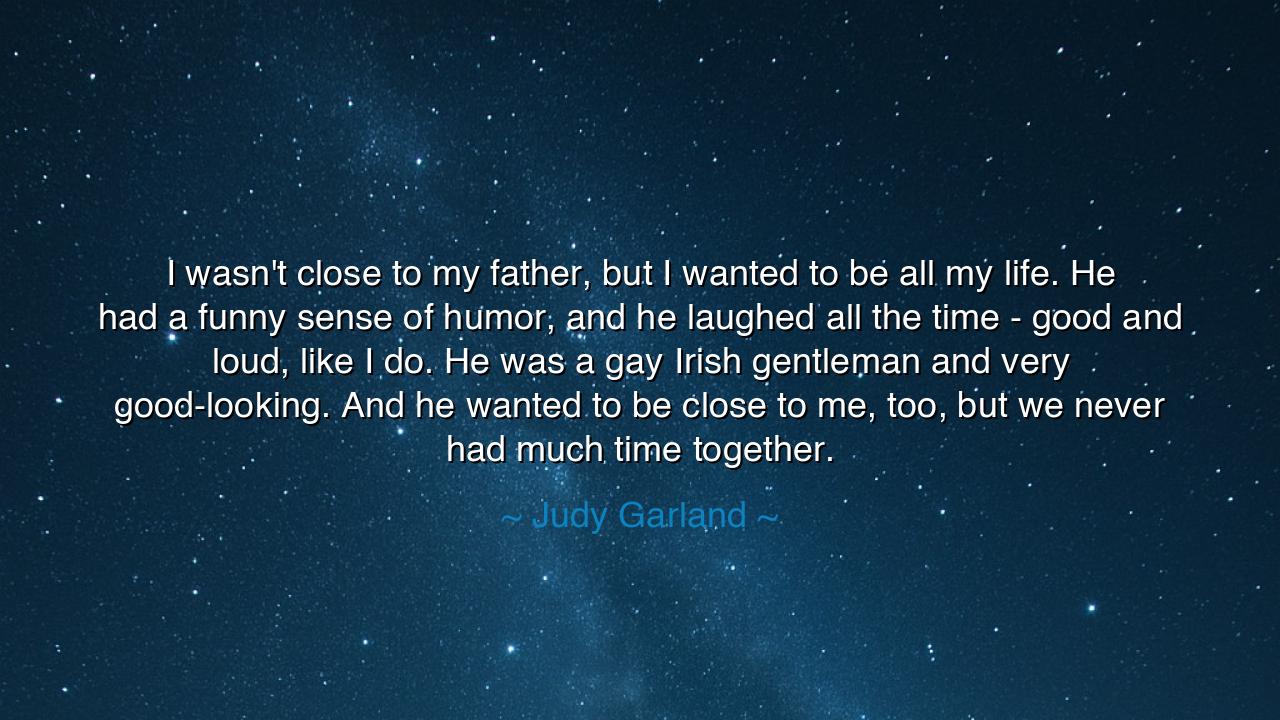
I wasn't close to my father, but I wanted to be all my life. He
I wasn't close to my father, but I wanted to be all my life. He had a funny sense of humor, and he laughed all the time - good and loud, like I do. He was a gay Irish gentleman and very good-looking. And he wanted to be close to me, too, but we never had much time together.






The words of Judy Garland—“I wasn't close to my father, but I wanted to be all my life. He had a funny sense of humor, and he laughed all the time—good and loud, like I do. He was a gay Irish gentleman and very good-looking. And he wanted to be close to me, too, but we never had much time together.”—carry the aching melody of yearning and unfinished love. Beneath their quiet sadness lies a truth older than time itself: that the bonds between parent and child, though eternal in spirit, are often fragile in life. Garland’s confession is not merely personal—it is universal. It speaks to that deep hunger within every soul to be known, to be seen, to be loved completely by the ones who first gave us life, and the sorrow that comes when time denies that closeness.
Her words flow like a lament from an ancient poet, for they capture both affection and loss in one breath. She remembers her father’s laughter, his “funny sense of humor,” the vitality that mirrors her own. In that laughter, she sees the reflection of her spirit—proof that though they were separated by circumstance and silence, their hearts were woven from the same fabric. Yet even this recognition deepens the pain, for what is more tragic than to see yourself in another’s soul, yet remain a stranger to them? Her line, “He wanted to be close to me, too, but we never had much time together,” is the sigh of all children and all parents who have loved imperfectly—those who, despite mutual yearning, are divided by distance, duty, or fate.
The origin of these words lies not only in Garland’s life, but in the eternal story of humanity. Judy Garland, born Frances Ethel Gumm, grew up on stages before she could grow into her own childhood. Her father, Frank Gumm, was a theatre manager and performer, a man whose exuberance and laughter were both his charm and his shield. He was also a man carrying private struggles, including a concealed identity in a time that condemned his truth. Theirs was a love constrained by misunderstanding and secrecy. The tragedy of their distance was not born of rejection, but of circumstance and silence—the same forces that so often stand between hearts that mean each other no harm.
In this way, Garland’s memory becomes more than personal nostalgia; it becomes a parable of human frailty. We are reminded of the story of King Priam and his son Hector from the ancient world. Priam loved his son deeply, yet pride and war stood between them. Only when Hector lay slain did Priam cross enemy lines to hold his body, whispering the words that could not be spoken in life. So it often is with us: we wait for death, or distance, or disaster to reveal the love we always carried but never fully expressed. Judy’s words echo the same wisdom: that love unspoken is love still felt—but love delayed is love forever wounded.
And yet, there is tenderness even in regret. Judy Garland does not condemn her father; she honours him. She remembers his humour, his laughter, his beauty—not as lost things, but as living echoes within herself. She laughs as he did, loudly and freely, and in doing so, she keeps him alive. Through her art, her songs, her laughter, she redeems the closeness that time denied. This is the mystery of inheritance: even when love falters in life, its essence flows unbroken through generations. What is left unspoken by the parent is sung by the child.
From her reflection, we draw a lesson as old as the hearth: do not wait to love aloud. Time is merciless, and silence is its accomplice. To those you love, speak while you can. Reach for closeness before the years place distance where warmth should be. Say what your heart holds, even if your voice trembles. Laugh with those whose laughter shaped your own, for laughter shared is love remembered. Regret is the shadow of love unexpressed, and Judy Garland’s words remind us that the truest courage lies in breaking that silence.
So, my friends, let us take her story as a living teaching. If there is someone you long to be close to—be it father, mother, child, or friend—do not delay the bridge you can still build. The world moves swiftly, and the hours are few, but love spoken is eternal. Let your laughter become their laughter; let your kindness be their remembrance. For when the day comes when time no longer allows you to speak, you will rest knowing you did not leave your heart’s music unsung.
Thus, Judy Garland’s lament becomes not only a memory of sorrow but a torch of wisdom: that love, even when unfulfilled, is never wasted. It remains in the laughter, in the echo, in the unbroken thread of longing that binds one generation to the next. Let her words remind us to cherish what time we are given—to turn silence into speech, distance into presence, and memory into gratitude. For in loving fully, and in forgiving what was lost, we transform tragedy into tenderness, and longing into the eternal language of the soul.






AAdministratorAdministrator
Welcome, honored guests. Please leave a comment, we will respond soon